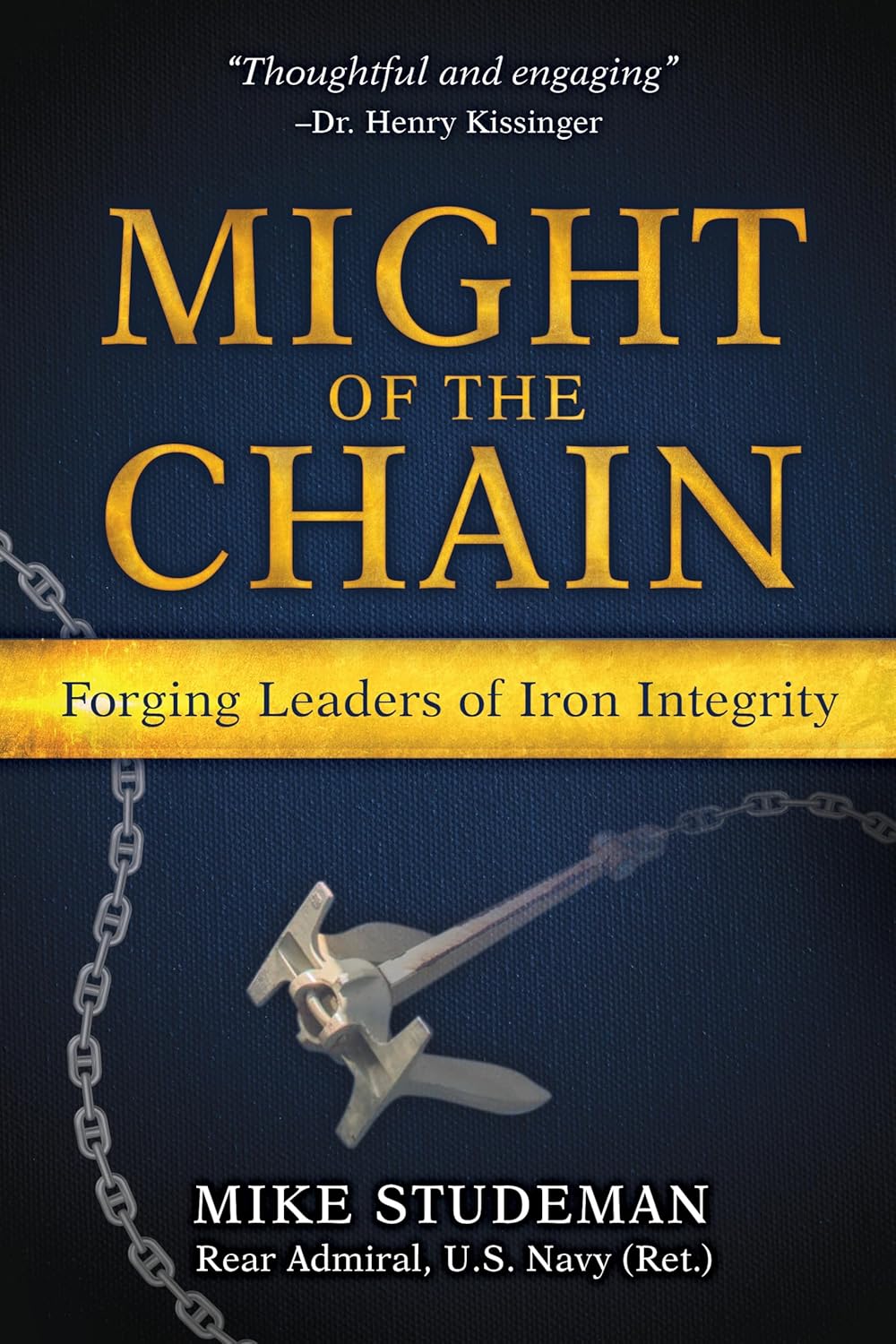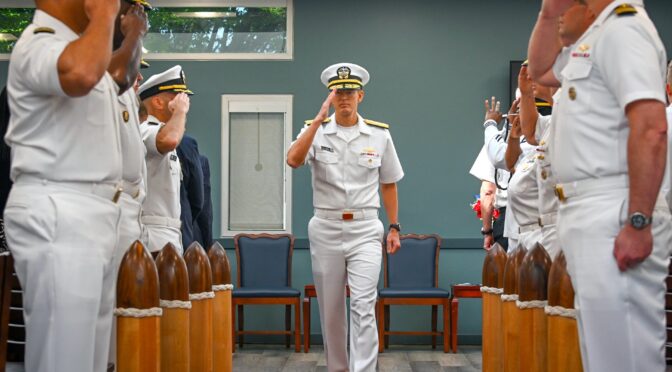By Commander Christopher Nelson, USN
I recently had the opportunity to correspond with Rear Admiral Mike Studeman (Ret.), who retired after over 35 years of distinguished service as a naval intelligence officer. He has authored a compelling book on leadership entitled, Might of the Chain: Forging Leaders of Iron Integrity. What stood out to me was how he skillfully wove personal experiences into his leadership lessons. The book not only offers valuable insights into leadership, but also provides a rare, humanizing glimpse into his personal journey. Our discussion explores both the practical advice and the personal stories that have shaped him, offering a deeper understanding of the leader behind the lessons.
Your book is rich with memorable quotes and epigrams. It is also full of short, interesting stories about past experiences. Why write this book, and do you journal? How do you capture in writing what matters to you for later use?
Thank you for the positive feedback on my leadership book. I wrote the book out of concern for growing dysfunction in American society and the failures of some in positions of power to lead properly—in principled, enlightened, and inspiring ways grounded in character, accountability, and fundamental decency.
I have been writing in personal journals since I joined the Navy (so for over 35 years now), making entries once or twice a month to record something worth remembering about family or life’s adventures. I have also kept separate professional journals to capture the wisdom of the world as I encountered it, no matter what the source. I found that manually copying quotes or insightful intellectual tidbits into a separate journal served as a form of memory reinforcement. Keeping information all in one handy place also facilitated ease of retrieval. The payoff over the years has been awesome, and I am glad I stay disciplined in using this expansive journaling practice.
What is the most underrated leadership quality in your opinion? And what is the most overrated?
I think authenticity is the most underrated leadership trait. Hollywood has created an impression that ideal leaders are hard-charging, independent, charismatic, and fearless individuals. In fact, leaders come in all forms and shapes—each can be highly successful in using their own combination of strengths to inspire others and achieve amazing results. The best leaders are always learning from others, but they know that their journey is a honing, not a disowning process. They are comfortable in their own skins. Being authentic is being true to you, taking pride in your origin story, and using it as a source of supreme foundational strength for continuing growth and impact.
The most overrated leadership quality may be extroversion. Over the long haul, I have seen a greater number of more effective introverted leaders than extroverted ones. I think this might be because extroverts sometimes try too hard to be everything to everyone. Introverts usually tend to be truer to themselves, which ultimately earns more trust from followers.
If your actions caused someone to lose trust in your leadership and you were aware of this, what steps would you take immediately to begin rebuilding that trust? What advice would you give to others in a similar situation?
If a leader is acting at all times in an ethical, caring, open, and constructive way then the likelihood of losing people’s trust is substantially lower. Trust can erode for any number of reasons. If people suspect the leader may not be well-intentioned, if they are not given an opportunity to understand the “why” behind directed actions, if the method for achieving a given outcome is questionable, the list goes on.
If I encountered such a situation, I would seek to understand the grievance and address it forthrightly with the people concerned. Many trust issues can be nipped in the bud by a leader simply showing up to listen to their people face-to-face and demonstrating an ability to factor in their concerns. Ignoring subordinates’ concerns, viewing complaints as illegitimate, and cutting off opportunities for healthy dialogue is the quickest way to fall off the trust cliff.
How do you differentiate between intuition and bias in your decision-making process?
I love this question. All experienced leaders intuit to some degree and grow to trust their instincts over time. However, this can be a double-edged sword as you imply. Leaders can grow overconfident, even arrogant, about what they think. The key to guarding against bias is subjecting ideas derived from individual intuition to the scrutiny of truthtellers in one’s circle of confidants, colleagues, and friends. The more diverse and widely experienced that circle, and the greater the willingness of a leader to take advice, the less likely bias will take root. At a minimum, a leader listening to the inputs of others will become more sensitized to second or third-order impacts and find themselves better equipped to anticipate dangers along any chosen path.
Can you share a time when your intuition proved right, but had to defend it against perceptions of bias?
My intuition after the Tiananmen Square massacre in 1989 was that a China led by the CCP would be the next major dissatisfied, powerful, and globally revisionist nation-state challenge after the fall of the Soviet Union. That proved correct. During my career, I faced repeated perceptions of Indo-Pacific bias as I tried to articulate emerging dangers. It was hard to watch China’s rise remain largely unaddressed except by the excessively wishful thinkers in the engagement crowd while America remained embroiled in the Middle East. China used 20 years of American distraction in the Global War on Terror to gain incredible levels of power and global influence to undermine the West and the current international order.
What is the best book about leadership you have read – but it was not explicitly a leadership book?
I am a fan of Alfred Lansing’s Endurance, describing Sir Ernest Shackleton’s trans-Antarctic expedition gone terribly wrong and the leadership he demonstrated to save his crew against incredible odds.
If you were a member of an interview panel, what is one question you would ask about someone’s leadership style that could lead to three distinct reactions: being immediately dissuaded from hiring them, feeling neutral or unimpressed, or being instantly impressed?
“Describe your greatest leadership success.” You can quickly tell by someone’s answer whether they focus on their individual efforts or a team’s. Do they make themselves the hero of their own story or do they humbly take pride in the collective contributions of a group and describe how acts of togetherness overcame a great challenge? You will get your answer in the first two sentences of the reply.
Senior executives in the private sector often work with leadership or skill coaches to refine their abilities. Atul Gawande, surgeon and writer for The New Yorker, wrote a compelling piece a few years ago about his experience using a retired surgeon as a coach. This coach observed him in the operating room—how he led his team, conducted surgeries, and interacted with nurses. DoD seniors do engage with “senior mentors” – retired flag officers, generals, and civilians. But this is often done in specific venues, not say, someone spending a week shadowing a senior. What are your thoughts on coaching and mentorship?
I agree that quiet shadowing during a leader’s day-to-day activities over the course of many days can yield important insights into how someone operates. I say this with caution, however. Sometimes it can be misleading if a shadowing period occurs during a period of quiescence when the leader is not facing high-pressure moments or a crisis where a leader’s behavior might alter in significant ways. This is one of the reasons why retired senior coaching in the military is normally done during exercises, which induce stress and thorny situations that can be a better test of a leader’s full range of capabilities.
Superb leaders know that personalized coaching is a rare luxury and therefore encourage their personal staffs to provide unsolicited advice on their performance. If, as a leader, you can build psychological safety for those around you and encourage them to speak truth to power, they can create an omnipresence of collective coaching that can benefit everyone.
You have been married to your wife for over 30 years and raised two boys. How do you think about being a husband and a father, and how leading at work might differ from how you think about leading – and following – at home?
Lynne and I have been happily married for almost 33 years. We started dating in college when we were only 19. I trust her implicitly and she is the most caring and intelligent person I know. She was selected into the Phi Beta Kappa Honor Society at William & Mary—I was not. Because Lynne is also an incredible mother, I usually follow her lead on the home front. Her intuition and instincts are impressive and I continue to learn from her in how she employs her high emotional quotient to navigate a wide range of intra-family issues. What I learned through active followership at home, if you want to put it that way, I added to my kitbag of skills at work. I think fatherhood and marriage can make you a better leader if you remain mindful of continually learning from all those roles.
How do you think people best adopt leadership principles and tools that fit their style or personality?
People should pay attention to the lessons of other leaders in their midst and experiment with techniques to see what works for them. Biographies of impressive leaders and books on leadership are helpful. In my book, I advise putting your own imprint on any borrowed advice. People should follow their instincts in this respect, but always pay particular attention to how their different approaches affect other people. Maintaining a sense of awareness of others and about yourself, without being overly self-conscious, can provide the right sensory inputs to enable fine tuning. Add your own stylistic stamp to anything you learn and apply, because in the end people still want your authenticity to shine through.
RADM Mike Studeman, USN, retired in 2023 after 35 years in the Navy. He led thousands of intelligence professionals at sea and ashore. He commanded a Global Communications Center, the Cyber Intelligence Center, and the Office of Naval Intelligence. He was also Intelligence Director for the Indo-Pacific and South America regions. In 2005 he was presidentially appointed as a White House Fellow, the nation’s premier program for leadership and public service. He currently consults, speaks, and is a National Security Fellow for the MITRE Corporation. He and his college sweetheart, Lynne, have two sons and live in Virginia.
Commander Christopher Nelson, USN, is a career intelligence officer and a regular contributor to CIMSEC.
The questions and comments here are presented in a personal capacity and do not necessarily represent those of the Department of Defense or the U.S. Navy.
Featured Image: Rear Adm. Mike Studeman assumed command of the Office of Naval Intelligence (ONI), and directorship of the National Maritime Intelligence-Integration Office (NMIO), during a ceremony in Suitland, Md., Aug. 1. (U.S. Navy photo)

